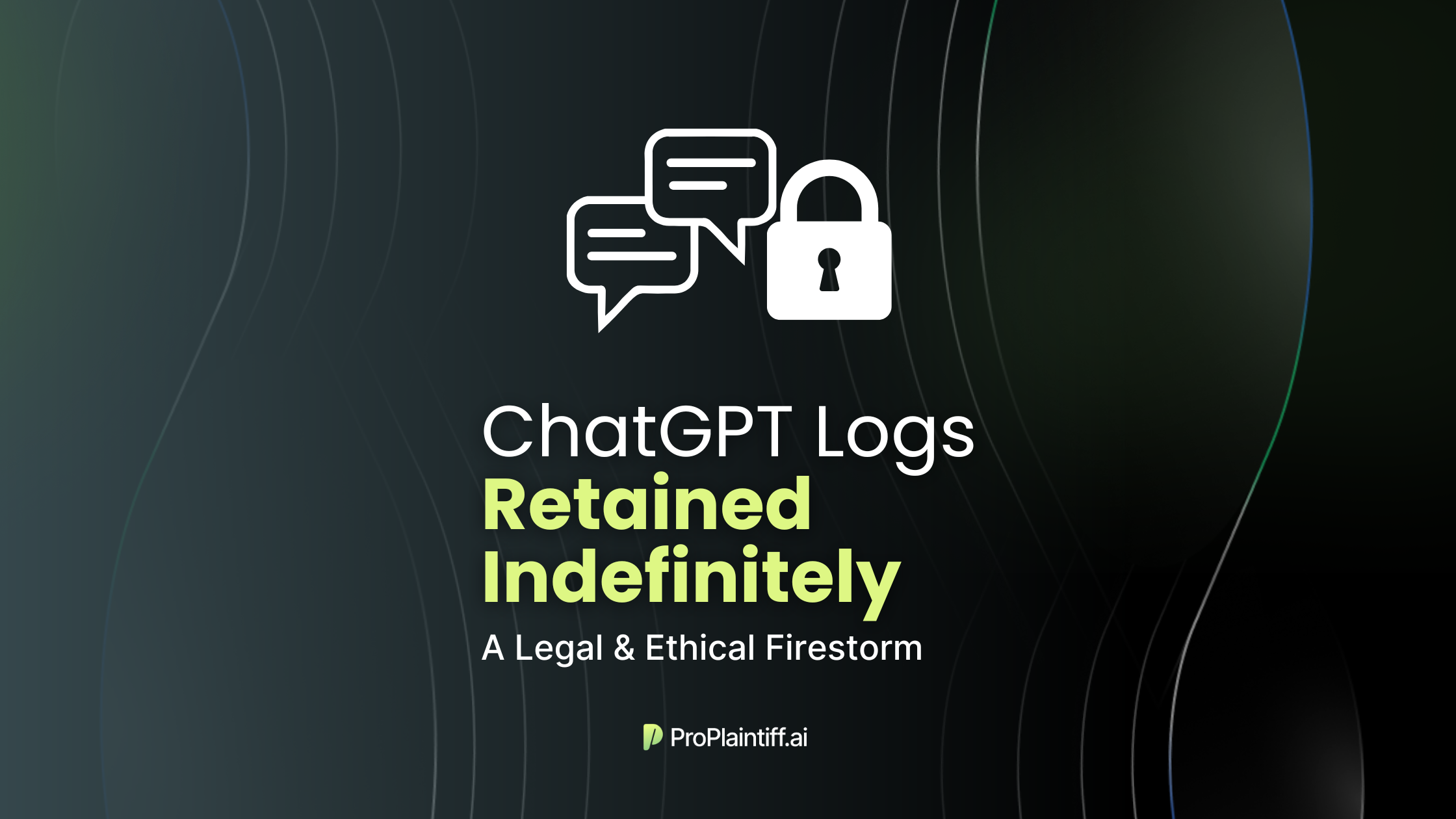
.webp)
.webp)
.webp)
.webp)

In a move that has sparked immediate concern among privacy advocates, tech leaders, and users alike, OpenAI has confirmed it will be forced to retain all ChatGPT logs indefinitely following a federal court order tied to The New York Times' lawsuit against OpenAI. The ruling mandates preservation of every user interaction, even those users thought they had deleted.
OpenAI strongly criticized the order. CEO Sam Altman described it as setting a bad precedent, while COO Brad Lightcap called it “inappropriate” and said it “fundamentally conflicts with our privacy commitments.”
Is this a case of essential legal compliance or a dangerous overreach in digital surveillance?
To most users, ChatGPT feels like a private tool—somewhere to ask questions, test ideas, or get help on sensitive topics. But the court order requiring OpenAI to retain all user logs indefinitely changes that perception dramatically.
This isn’t just about keeping transcripts of chatbot conversations. It’s about the long-term storage of potentially identifiable user input, tied to IP addresses, device data, and timestamps. That raises serious questions about privacy, consent, and transparency, especially given how deeply ChatGPT is now woven into education, healthcare, legal work, and daily communication.
It also highlights a broader problem: laws haven’t caught up to how AI tools are used or how much personal data they can absorb. The ruling sets a precedent that could be applied in future cases across jurisdictions.
In short, this isn’t just a ChatGPT story. It’s a wake-up call about how AI, data, and privacy are colliding in real time—and how users are often the last to know.
On May 13, 2025, a federal judge issued a preservation order requiring OpenAI to retain all ChatGPT user logs as part of the ongoing The New York Times lawsuit. The judge justified the ruling by emphasizing the potential evidentiary value of logs in proving whether the model reproduced copyrighted content.
This order affects past and future data, including content users may have already deleted. For OpenAI, it poses both a technical and legal challenge, overriding existing policies designed to purge user data after short retention windows.
When courts refer to "logs," they're not just talking about the text users enter. These logs include:
Even if a user deletes a conversation from their dashboard, under the court order, OpenAI must keep the underlying data. This blurs the line between user control and institutional control, raising concerns about how much personal context is preserved without user consent.
ChatGPT is frequently used for private, sensitive conversations—from health questions and legal hypotheticals to personal dilemmas. With the court-mandated retention of logs, those private conversations can now become part of long-term data archives.
This change introduces serious risks. Sensitive information could be exposed through data leaks or be accessed in future legal disputes unrelated to the user’s original intent. Since users were never informed that their deleted chats might live on, the policy undermines trust.
OpenAI has called the ruling a “privacy nightmare.” The company argues that the preservation order forces it to act against its own privacy policies and user expectations. Brad Lightcap labeled the requirement “inappropriate,” and Sam Altman said it sends the wrong signal to users worldwide.
Internally, the company also worries that this could encourage other courts to issue similar demands, expanding legal exposure and complicating OpenAI’s ability to maintain user privacy and data minimization practices.
The ruling stems from a copyright lawsuit filed by The New York Times, which claims OpenAI improperly used its content to train ChatGPT. During discovery, the court determined that logs of user conversations could provide evidence of this alleged misuse.
Attorneys believe some user outputs might reveal if ChatGPT can reproduce or paraphrase protected content. That possibility was enough to convince the court to issue a blanket preservation order for all logs.
Courts are beginning to treat AI systems not as black boxes, but as traceable systems whose outputs and interactions can be subject to legal scrutiny. That includes treating user logs as potential evidence.
While AI developers argue that models don’t “remember” data in the traditional sense, user interactions can hint at what models learned—and what they’re capable of recreating. This case may set a tone for how AI-generated content will be viewed legally moving forward.
Yes. While technically limited to this lawsuit, the preservation order establishes a powerful legal precedent. Future lawsuits involving copyright, bias, or harmful outputs could demand similar data preservation from other AI providers.
If this becomes the norm, platforms may be forced to redesign their infrastructure to allow for more granular, longer-term storage—an expensive and privacy-challenging change for the entire industry.
The U.S. court order may directly conflict with the European Union’s GDPR Article 17, which guarantees the “right to be forgotten.” If European users request the deletion of their ChatGPT data, OpenAI could be legally barred from complying in the U.S.
This legal contradiction could result in fines or enforcement action from EU data protection authorities. It also adds pressure on OpenAI to silo its systems, rework jurisdictional data handling, or push for legal exceptions that don't yet exist.
Those who rely most on AI’s flexibility and speed are now also most vulnerable to unintended data exposure.
Users can still remove conversations from their personal interface and disable chat history. However, under the current legal order, OpenAI is required to store that data internally.
The “Delete” button no longer guarantees true deletion, turning a once-trustworthy feature into a cosmetic one. Until the court lifts the order or OpenAI changes its architecture, data marked as deleted may live on indefinitely.
Yes. Any platform that processes user input—whether it’s Anthropic, Google, Meta, or others—could face similar legal demands. Courts may now see AI logs not as ephemeral, but as evidence-rich datasets worth preserving.
This trend could force AI developers to store and secure more user data than ever before, changing the cost and complexity of compliance industry-wide.
Few companies have responded publicly, but behind the scenes, concern is widespread. Legal teams are reviewing their own data policies and preparing for the possibility that they, too, may be compelled to preserve logs.
Privacy-focused organizations have already raised red flags. They argue that this kind of legal decision undermines years of work toward privacy-by-design in the tech sector.
Digital rights groups and privacy lawyers are divided. Some say it’s a necessary step in evidence preservation. Others believe it’s a step backward for digital privacy.
Experts agree on one thing: AI cases like this are becoming more common, and they’re outpacing existing laws. The balance between legal discovery and user privacy is fragile, and international platforms will continue to face growing legal tension between jurisdictions.
This ruling is especially critical for companies using ChatGPT in day-to-day operations. Sensitive documents, draft communications, or internal notes entered into the system may now be part of a permanent record.
For legal professionals, the implications are especially urgent. See our full breakdown in AI tools lawyers should NEVER use for case document review.
Organizations may need to revise internal policies, limit use cases, and explore alternative tools until the legal uncertainty is resolved.
The preservation order represents a key moment in AI governance. It shows that AI data is no longer beyond the reach of courts—and that users, developers, and regulators must rethink how personal information flows through these systems.
We’re entering a phase where accountability, not just innovation, will determine how trustworthy and lawful AI truly becomes.
Why is OpenAI being forced to retain ChatGPT logs indefinitely?
Because of a court order related to a lawsuit filed by The New York Times. The data is being preserved as potential evidence.
Can I still delete my ChatGPT history?
You can delete it from view, but OpenAI must preserve the logs due to the court order.
What kind of data is included in the logs?
Everything from your text inputs to IP addresses, timestamps, and session information.
Does this affect European users?
Yes. It may put OpenAI in conflict with GDPR’s right to erasure provisions.
Will this apply to other AI companies too?
Likely, yes. If courts consider AI logs valid evidence, other platforms could face similar demands.
Should companies be worried?
Yes—especially if they use AI tools for sensitive or confidential tasks.